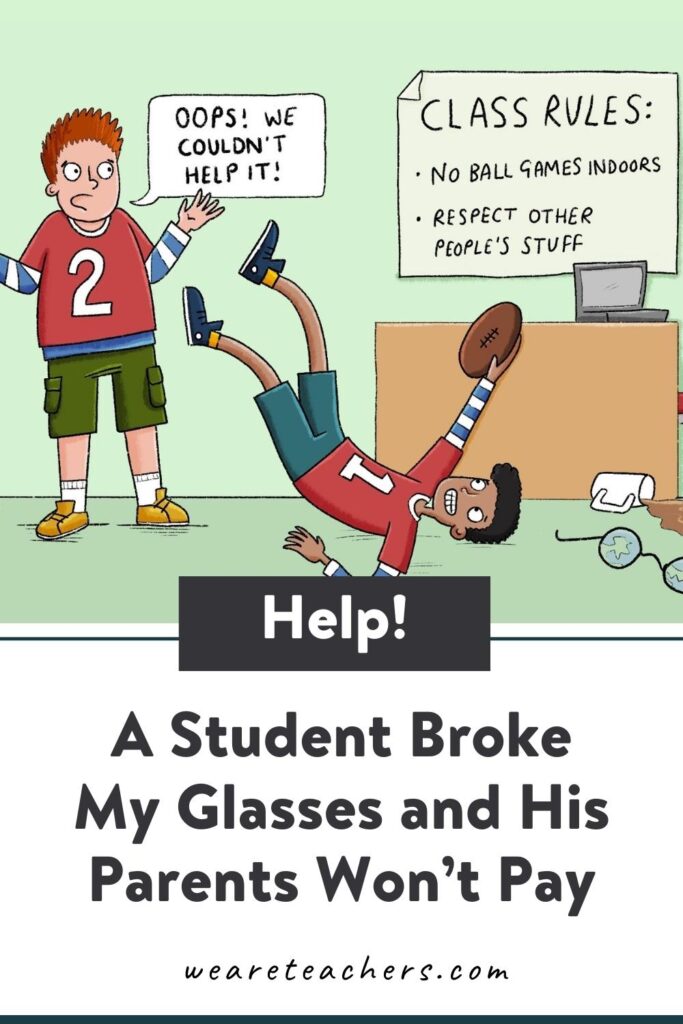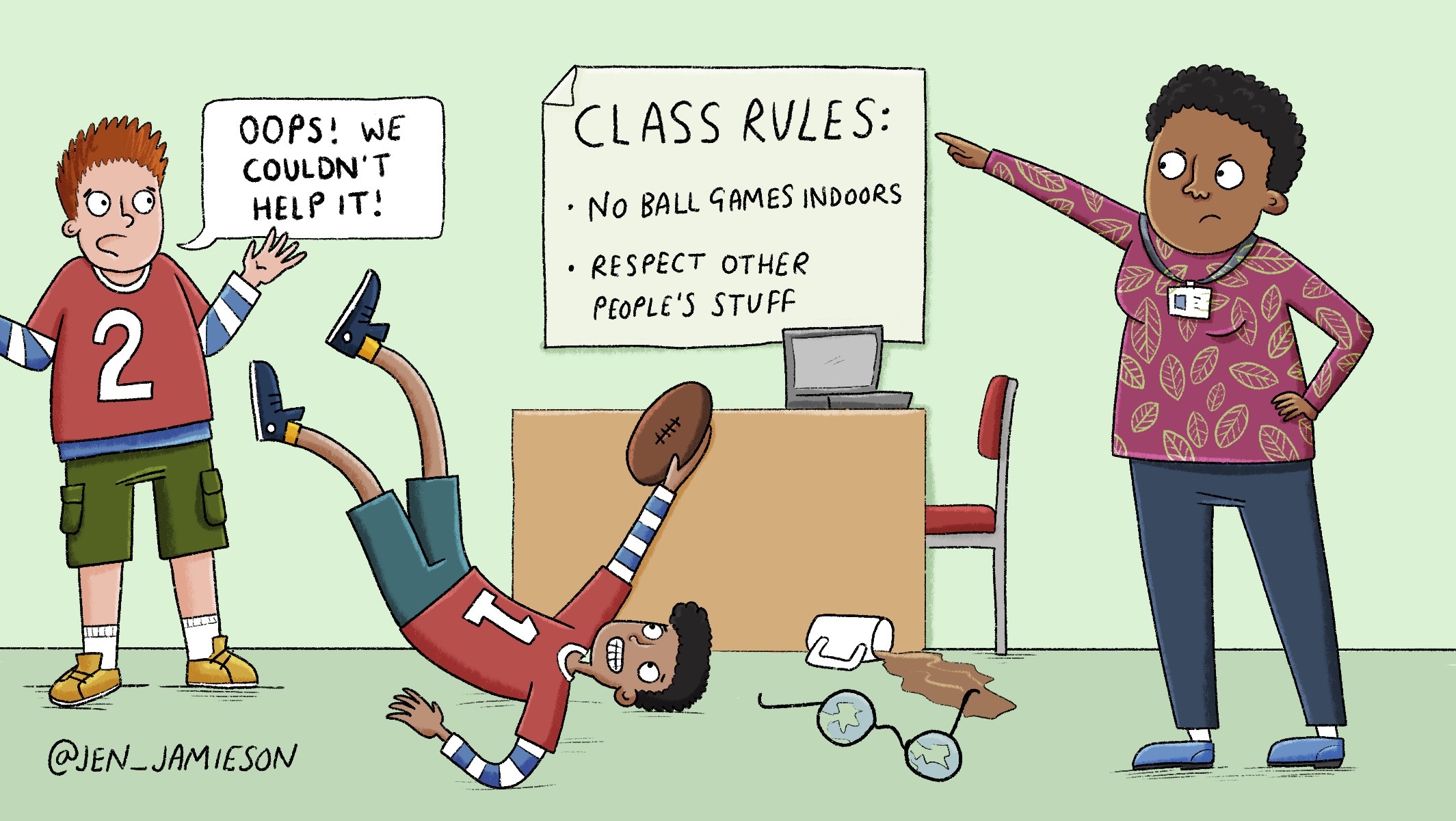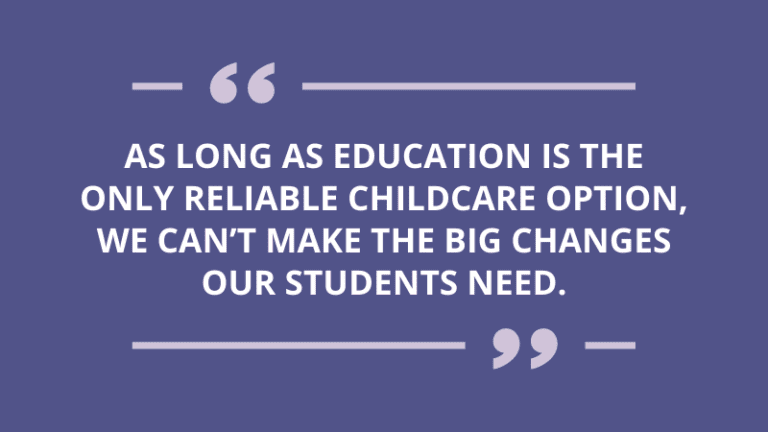Dear We Are Teachers,
I teach high school science. Maybe a minute before the bell to leave one day, two students were playing catch with a Styrofoam sphere from a molecule unit. I told them to stop, but they didn’t. The next throw, one student dove onto my desk to catch it and shattered my glasses in the process. The parents refuse to pay because, according to them, 1. I shouldn’t have had my glasses out on my desk, 2. students shouldn’t have had time to play catch, and 3. I should have intervened more forcefully to get them to stop. The principal says that these parents are known for entitled behavior like this, but recommends I drop it and get a new pair of glasses myself. Is this a lost cause, or should I keep pressing the issue?
—Bitter and Bespectacled
Dear B.A.B.,
I asked three different administrators—ones I know personally—how they would handle this situation. This is how they responded.
Administrator 1, high school
“Oh, hell no. I’d ask the parents directly, ‘Can you tell me what life lesson you were hoping to model for your son by not reimbursing his teacher?’ It’s true that I can’t force you to pay up. But I also can’t force teachers to write letters of recommendation, force counselors to do special favors in the future, etc. Your choice.’”
Administrator 2, middle school
“I understand the principal just wishing it would go away, LOL! But the cost of a teacher realizing you don’t have their back isn’t worth it. What I would do as the principal is call the parents, student, and teacher in together, and explain that this is both a discipline and a damage issue. I would tell the student, ‘I need you to think of something you can do for your teacher to rebuild their trust. You can ask them for a project they need help on, or we can go the permanent record route.’ I would tell the parents, ‘All kids make mistakes. But I don’t think you’re the kind of parent who wants to teach their kid that there aren’t consequences, are you? I think the right thing to do is reimburse the teacher, but then make your son work to reimburse you.’ Ultimately it’s going to be the parents’ choice, but I can at least be on the record that I supported the teacher.”
Administrator 3, middle school
“Unfortunately, I think the teacher may need to drop it and pay for the glasses. The teacher’s best approach might be to go to her appraiser and say that she will pay, but that she could really use some support. Could they offer their support with student behavior and help improving classroom management? Then they are taking ownership of their piece but also asking them to take ownership for their role: supporting teachers. Just a note as a principal: I would also start writing this kid up for insubordination every time they disobey. There needs to be a written documentation of this child’s misbehaviors. Finally, I would also want her to be empowered to build relationships with kids. I can’t imagine a kid who knows you love them deep down being truly destructive and flippant about it.”
Even with three totally different personalities and approaches to responding, there are three things these administrators have in common. These truths, I think, show the best route to take:
- Treat the defiance and the damage as separate offenses. That doesn’t mean you should ignore the damage since it wasn’t intentional (as I like to say, sometimes impact matters more than intent). Just don’t tie a disappointing outcome for one situation to both.
- Let the parents see the benefits of reimbursing you. To me, these parents sound like the type of people who would turn small claims court or a police report into a much bigger headache than anyone could have predicted. If they decide to reimburse you, let this be a conclusion they come to themselves based on what a fantastic teacher and how you didn’t hold a grudge when you had every right to, not because they were backed into a corner.
- Request that your administrator hold the student accountable for his defiance. The biggest liability here is not unpaid damages but a student who never has to answer for ignoring instructions for his own safety.
Dear We Are Teachers,
I put a lot of time and effort into making 8th grade social studies fun and engaging. This year, I have a class that flat-out refuses to talk. Class discussions are silent. No one raises their hand to answer. When I pair them up to work together, they won’t speak to each other. It seems like defiance at this point, but in my 20 years of teaching, I’ve never seen anything like it. Any tips?
—A Mere Echo In the Wells of Silence
Dear A.M.E.I.T.W.O.S.,
I bet you’ve seen this happen but on smaller levels. A class that just doesn’t “vibe” like your others. A class that took a lot longer to bond. Maybe one bossy ringleader intimidating everyone else into silence. Saying you’ve never seen anything like it might be giving the situation more power than it really deserves.
I think deep down, teenagers want to participate, connect, and have fun at school. But having fun, smiling, admitting that you like something, talking with your peers—those are all acts of vulnerability. Right now, your students aren’t willing to be vulnerable. You have to first meet them where they are before leading them.
Start small by allowing them to write their responses. Have them type out their responses for silly attendance questions on your school’s management system or Google Classroom. Hold a silent class discussion. Find out more about them, and let them find out more about you. Pretend they are already your favorite class—science tells us they’ll live up to it! I also love these five ways of boosting classroom morale when the vibe is off.
The one thing to avoid at all costs: frustration. Showing you’re annoyed that they won’t participate is a surefire way to get them to totally shut down.
Dear We Are Teachers,
I am a mentor teacher to a new teacher on our campus this year. From my observations, my new teacher seems to be doing fine, but my principal called me in yesterday and said her teaching and classroom management are so bad that she doesn’t anticipate renewing her contract. The problem is I’ve been telling my mentee she’s doing great—because I thought she was! I feel like if I suddenly come down hard on her out of nowhere, she’ll be confused, but my principal said to keep our convo between us. Help!
—Stuck in the Middle With Me
Dear S.I.T.M.W.M.,
To me, this sounds kind of lazy of your principal’s part (don’t tell her I said that). Telling a teacher they need to do some big overhauls to keep their job is … your principal’s job. It’s unfair to expect you to do the heavy lifting, especially in a mentor teacher role. Plus, it’s super unprofessional to share her opinion on another teacher’s performance with you.
Request a follow-up meeting with your administrator. Say, “I’m all on board to support my mentee, but I realized there’s a pretty big discrepancy. My feedback to her has reflected that I think she’s doing really well for a new teacher. But from what you’ve seen, she’s struggling in a very serious way. I think it would help both of us if you met with her and gave her your specific areas for improvement. That way, we’re all on the same page about what success looks like and how I can support her in getting there.”
The more I think about this, the more mad I get. She put you in an uncomfortable position purely because she wanted to avoid an uncomfortable conversation. It would also make me wonder: What does she tell other teachers about me?
Tread lightly, friend. But if your principal continues to tiptoe around the truth, it sounds like you AND your mentee might need to find a better school.
Do you have a burning question? Email us at askweareteachers@weareteachers.com.
Dear We Are Teachers,
I teach middle school. Last week, one of my students accidentally knocked my potted plant off its spot on the windowsill and broke the pot. After class, I told my student in private that I don’t really care about the pot or the plant, but that her response hurt my feelings (she laughed and refused to apologize for hurting a plant). The next day, my principal called me in to say I shouldn’t tell students they hurt my feelings because it’s “unprofessional” and made my student feel bad. Now I’m being asked to apologize to the student! Am I out of line, or is my principal?
—PATHOS FOR POTHOS


